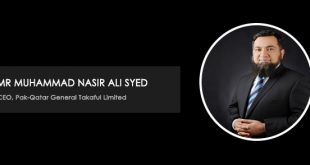Takaful is Islamic insurance and is relatively a new concept in the financial markets. Takaful is based on pooling of funds where gains and losses are shared equally. Prime markets for Takaful include GCC and Malaysia. Earlier this decade when Islamic banking was picking up pace and Islamic banks was actively penetrating the market, estimates were circulated that Islamic banking in terms of deposits would be 10 percent of the overall industry by year 2005, which was yet to be achieved in 2013.
According to the World Takaful Report released by Ernst and Young in 2012, the global Takaful industry continued to show double-digit growth in 2011. Amongst key markets, Malaysia and UAE again achieved growth rates of over 24 percent, whilst Saudi Arabia saw its gross contributions increase by US$0.5 billion. The challenge was once again, maintaining growth with profitability in the current economic climate. Overall Return on Equity (ROE) for the Takaful industry was lower than conventional, both in the GCC as well as in Malaysia. However, a significant contributing factor to this was the lower investment returns for the industry relative to returns by conventional insurers. Takaful industry has now obtained significant market share versus conventional insurance in most GCC countries as well as in South East Asian markets. There are a number of drivers behind this growth but one that is becoming increasingly important is regulatory support through appropriate amendments in legislature to provide a level playing field with conventional insurance companies. Global Sukuk market was US$169 billion in 2011 based on latest numbers available.
Takaful companies have not been able to grow in Pakistan since our fixed income; especially the Bond and Sukuk market is underdeveloped. Takaful is one percent of the global insurance market and three percent of the market in Pakistan in terms if net premiums collected. Presently, there are three Takaful and two family Takaful companies operating in Pakistan against 48 conventional insurance companies. Despite the positives, keeping in view the untapped potential and population growth, new investments in Takaful have only been restricted to investing in office infrastructure rather than opening of new companies.
Although on paper, both conventional and Islamic insurance look same, there is a difference in the way through which claims, premiums and the business model works. Conventional insurance is such where the risk is transferred to the insurance company upon payment of net premium, which means incase of a loss, the insurance company is liable. In Takaful, the risk is shared between the participants and not transferred to the insurance company. The Takaful company only acts as a manager of the pool of funds collected. Conventional insurance covers uncertainty of an event for which coverage is provided to the policy holder, however, under Takaful, insuring something or any event, which is uncertain falls under “Gharar” which is forbidden. Hence, Takaful companies bring down the level of uncertainty through “Conditional Donations” or “Tabarru” for a good cause i.e. to mitigate the loss suffered by any one of the participants.
Under conventional insurance, if a loss occurs, the insured pays the premium in the expectation of gain against claim. If the anticipated loss does not occur, the insured loses the amount paid as premium. If the loss does occur, the insurer loses a far larger amount than collected as premium and the insured gains by the same. This is classified under “Gambling” where a small payment is given in hopes of earning more that what is paid through a loss. Takaful once again is based on sharing of risk based on brotherhood. Conventional insurance companies are the largest players in the fixed income market and invest the net premium collected in TFCs, bonds stretching upto 30 years and securities. Takaful can only invest in riba-free instruments, which includes the Sukuk market. The profit of the conventional insurance company through investments and premium collection is distributed among the shareholders. As Takaful is based on sharing of risk, returns from investments and collections are divided among the participants. Investments by conventional insurance companies in the fixed income market are considered Haram since the returns are based on interest Riba, which is prohibited.
The prime challenge faced by the industry is education and how Takaful is different from conventional insurance. Commercial banks financing cars often wither leave this option to the buyer or have alliances with conventional insurance companies for their customers. In September 2012, SECP allowed conventional insurance companies to sell Islamic insurance products through their windows. This would allow consumers, all over Pakistan, to benefit from “One-Window” counters to apply for either conventional or Islamic insurance. This was seen as a good initiative as the overall market would grow. Current Takaful companies filed a case in the court not to allow current insurance companies launch Islamic products looking at their own gains rather than assist in developing the overall market. It is, however, expected that conventional insurance companies will launch Islamic products in 2013.
Takaful companies are hard hit as conventional insurance companies have been given the right to operate Islamic windows. In order to develop the Takaful market, it is essential that fixed income market also develops to all such companies invest residual funds for a return. Under present times where industrial growth is slow and businesses are in consolidation, expecting private sector mandates for Sukuk issuance will remain slow. Takaful companies in Pakistan do not invest in the international Sukuk markets as Islamic standards differ from country to country. It is also unfortunate that no global standards exist, which can be followed by all Islamic financial institutions world over. Takaful has a wide scope in Pakistan, challenge being to education people about Islamic model of insurance. If the end consumer is trained either through mass or niche marketing, Takaful business will grow. The growth, however, cannot be seen in isolation unless a formal Sukuk market develops in Pakistan just as other fixed income securities.
 PAGE Blog Business Weekly Magazine
PAGE Blog Business Weekly Magazine

